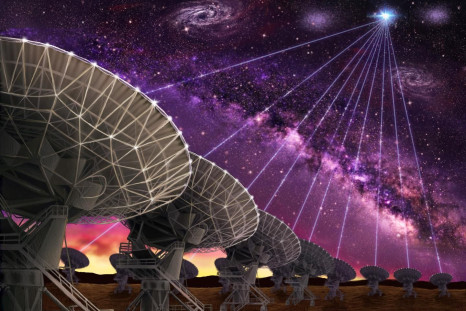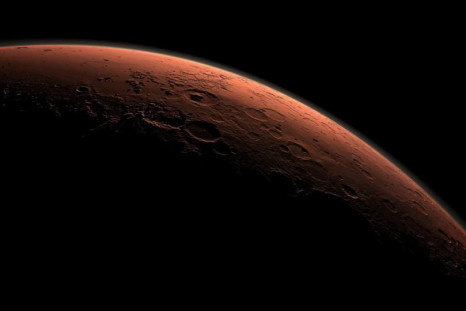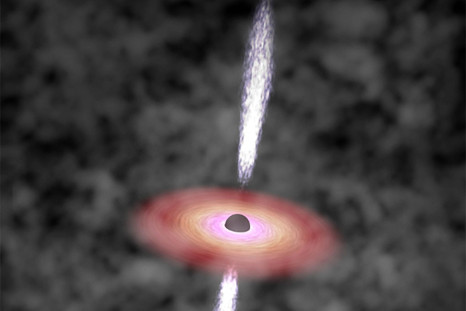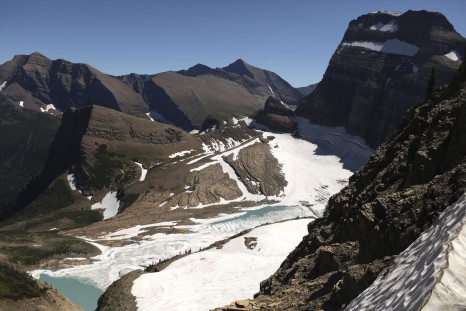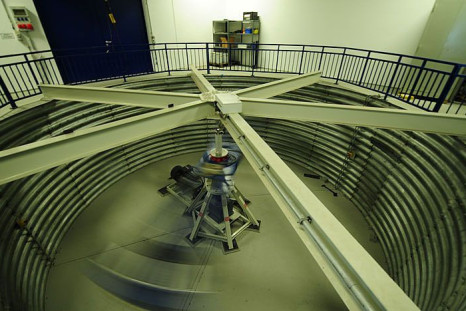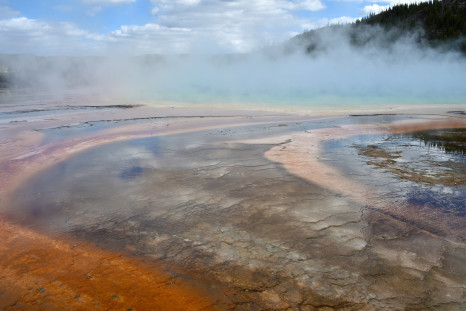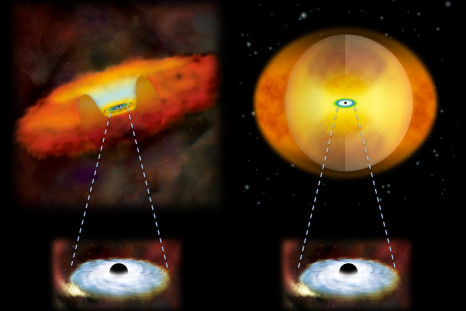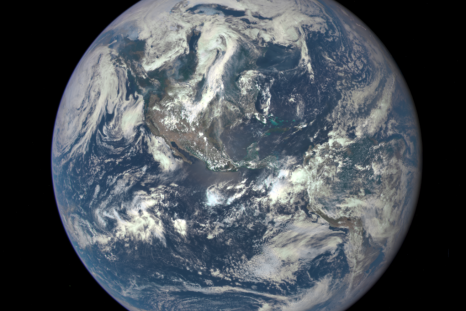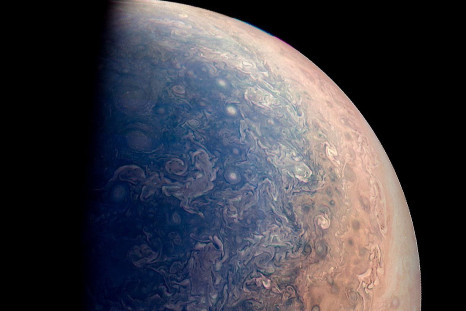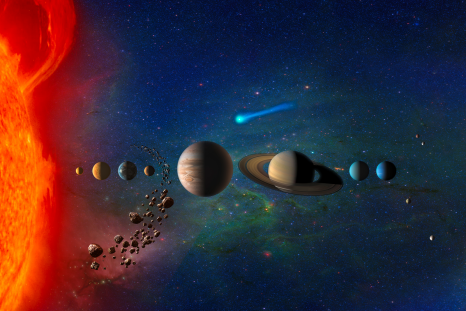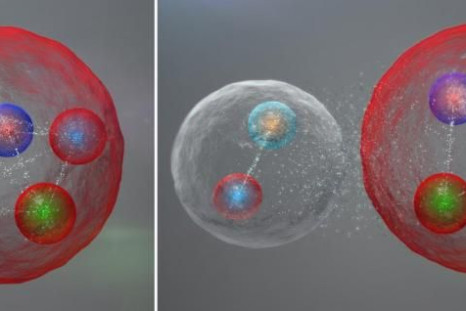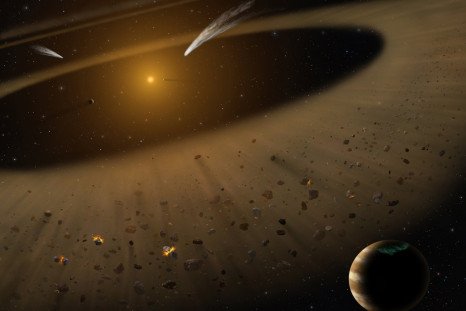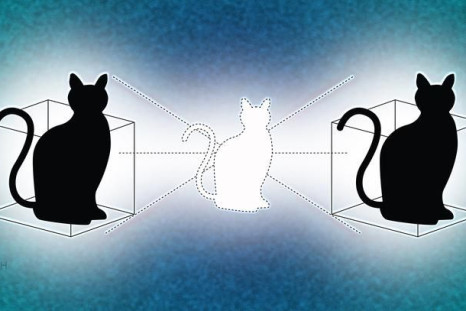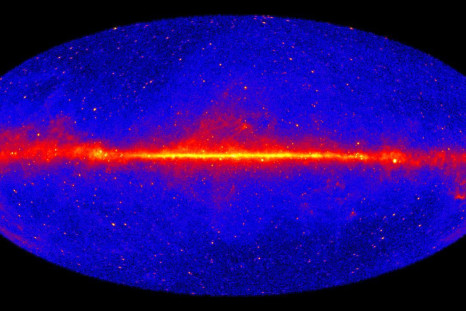Astronomers Discover A Fast Radio Burst That's Even Stranger Than Ones Detected Before
The mysterious flash of high-energy burst, called FRB 150215, was detected in February 2015 using the Parkes radio telescope in Australia.
Bright Streaks Around Large Martian Craters May Have Been Created By High-Speed Tornadoes
A team of researchers used a combination of laboratory impact experiments, computer models and geological observations to explain the formation of bright streaks around some impact craters on Mars.
Rise Of The Superbugs: Study Reveals How Antibiotic-Resistant Enterococci Came To Be
A new study pegs the origin of these "superbugs" to about 450 million years ago, when life made its first foray into land.
Massive Quasars From The Dawn Of Time Defy Theoretical Models Of Black Hole Formation
Astronomers have discovered three quasars — each a billion times the mass of the sun — whose very existence challenges our conventional understanding of how supermassive black holes form and evolve.
Supernova 'Kill Zone' May Not Be As Big As Previously Believed
A new study estimates that a supernova about 40 or 50 light-years away from Earth will not have the potential to trigger a mass extinction event on our planet.
Climate Change Is Killing Montana's Glaciers
Data released Wednesday by the U.S. Geological Survey and Portland State University has revealed that over the past 50 years, glaciers in the Glacier National Park in Montana have retreated by 39 percent.
Quantum Entanglement Persists Even Under High Accelerations, Experiments Reveal
A series of experiments has revealed that quantum entanglement — the phenomenon Einstein once derisively referred to as "spooky action at a distance" — persists even at high accelerations.
Scientists Observe Quantum States Of Molecular Ions Using Laser-Cooled Atomic Ions
A team of researchers from the National Institute of Standards and Technology has successfully used previously known techniques to cool and control molecular ions.
Origin Of Life: Scientists Discover Oldest Evidence Of Life On Land In 3.5 Billion Year Old Hot Spring Deposits
The discovery of fossils of microorganisms in 3.48 billion-year-old hot spring deposits pushes back the earliest known existence of microbial life on land by at least 580 million years.
Trump Administration Will Not Move Embassy In Israel To Jerusalem: Report
According to Israeli news website NRG, President Donald Trump has informed his Israeli counterpart Benjamin Netanyahu of his decision to keep the embassy in Tel Aviv.
CERN Inaugurates New Linear Accelerator That Will Eventually Double LHC Beam Intensity
Linac 4, which will be connected to CERN’s accelerator complex sometime between 2019 and 2020, will eventually double the beam intensity to be delivered to the Large Hadron Collider.
Supermassive Black Holes In Merging Galaxies Are Shrouded In A Thick Sphere Of Gas And Dust
Observations made using NASA's NuSTAR telescope have revealed that supermassive black holes in merging galaxies do most of their feeding during the later stages of galactic mergers, when they're heavily obscured.
Scientists Create High-Conductivity Transparent Nano-Scale Film Material
The new material, made of a compound called barium stannate, could lead to the creation of smaller, faster, and more powerful electronics, and more efficient solar cells.
Scientists Study How DNA-Binding Proteins Read, Interpret 'Epigenetic' Changes
The study could provide clues to the genetic code that controls the expression of genes, and may also further our understanding of embryonic development and diseases such as cancer.
Scientists Demonstrate Chemical Bits Are Stable Enough To Store Information
A team of researchers has demonstrated that chemical bits are stable enough to store information.
Silica-Rich Materials In Earth's Crust May Have Rained Down From A Steamy Atmosphere
Researchers from McGill University in Canada argued in a new study that the silica-rich minerals in Earth's crust may have been deposited by a “silicate rain.”
NASA's Juno Reveals Swirling Clouds And Giant Storms Over Jupiter's South Pole
The image was captured using the high-resolution JunoCam instrument from an altitude of about 32,400 miles above the gas giant’s atmosphere.
NASA's Mars Reconnaissance Orbiter Snaps Photo Of Recurring Slope Lineae On Slopes Of Valles Marineris
The image, snapped using the orbiter's HiRise camera, shows several RSLs that appear as dark lines extending downslope.
NASA Receives 12 Proposals For Next New Frontiers Mission
The 12 proposals will now undergo scientific and technical review over the next seven months.
Climate Change Is Causing The Dissolved Oxygen In World's Oceans To Plummet
A new analysis of nearly five decades of data has revealed the oceans' dissolved oxygen levels started dropping in the 1980s as global temperatures began to climb.
Wildlife Conservation: World's Richest Nations Aren't Doing Enough To Save Large Mammals From Extinction
A team of researchers has found a marked variation among countries in contributions to the conservation of world’s large mammal population, with poorer countries taking a more active approach than their richer counterparts.
Noise Pollution: Even America's Protected Areas Are Not Safe From Human-Caused Racket
A study of 492 protected sites around the continental U.S. revealed that in nearly two-thirds of these areas, noise from human activities was twice as high as natural background sound levels.
Scientists Use Simulated Moondust To Forge Bricks In A Solar Furnace
The proof-of-concept experiment proves that it is possible — at least in theory — for future lunar colonists to build habitats using material available in situ.
Analysis Of Global Warming 'Hiatus' Confirms, Once Again, That Humans Are Driving Climate Change
A fresh analysis of the apparent slowdown in the rate of rise of global temperatures between 1998 and 2012 has shown that the phenomenon was the result of natural short-term variability that does not affect long-term climate projections.
Physicists Hunt For Hybrid Mesons To Understand Strong Nuclear Force And Solve The Quark Confinement Problem
If hybrid mesons, which are identical to ordinary mesons in composition but quite different in behavior, are discovered, it would help us expand our understanding of the strong nuclear force.
A Planetary System Just 10.5 Light-Years From Earth Could Shed Light On Solar System's Formation And Evolution
This system, which is just 10.5 light-years from Earth, is 800 million years old, and could help scientists understand how our solar system formed and evolved.
The Language You Speak Affects How Your Brain Experiences The Passage Of Time
Experiments conducted by a team of linguists suggest people who fluently speak two languages think about time differently than those who speak only one.
Physicists 'Breed' Schrödinger’s Cats To Shed Light On Boundary Between Quantum And Classical Worlds
A team of researchers has come up with a technique to “breed” Schrödinger’s cats, and has, in the process, figured out a way to create cats with much bigger amplitude than ever before.
Pulsars, Not Dark Matter, May Be Responsible For Excess Gamma-Ray Glow At Milky Way's Centre
According to a new study, the mysterious excess of high-energy gamma ray emissions coming from the Milky Way’s centre is most likely caused by pulsars and not dark matter as previously thought.
Water On Mars: NASA's MRO Snaps Image Of Sedimentary Rock Layers In Valles Marineris' Ganges Chasma
The image, taken using the orbiter's HiRise camera, shows sedimentary rock layers covered in wind-blown sand.



